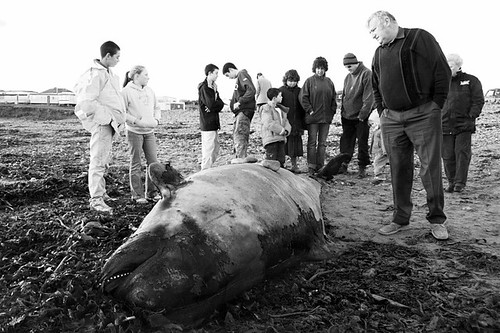The New Scientist is one of my favorite publications — especially its online version. It was launched in 1956 “for all those men and women who are interested in scientific discovery, and in its industrial, commercial and social consequences.” It’s punchy, smart and entertaining.
The New Scientist is also where I find many counterintuitive gems — eerily metaphoric of big issues elsewhere. Consider its recent report on beached whales:
Large whales that strand themselves should be killed, as any attempts to save them are probably futile and likely to cause more suffering, according to animal welfare specialists…. Euthanasia can be a very emotive issue… but it is often in a stranded whale’s best interests. Death is normally induced by lethal injection…. Rescuers often have struggled to save stranded whales. In 2002, a pod of pilot whales stranded themselves on Cape Cod in Massachusetts, – many were refloated, but proceeded to re-beach themselves, with fatal results.
This report was interesting and surprising in its own right. It contradicted popular belief, and sparked discomfort. But it reminded me that it’s often unnatural, inhumane and more destructive to keep sick things alive — especially big things.
In these messy times, our own government and citizens should consider the lesson of beached whales. Too often our gut instinct is to fiercely preserve what we have and what we know. The bigger the institution, the more protection we seem to think it deserves — even when we know it would be best in the long run to simply let go and start over.
But unfortunately, “too big to die” has become a ubiquitous phrase in our lexicon. And in many prominent cases, too-big-to-die has been put into practice. Consider the auto-manufacturing sector. Think of finance, banking, health care and public education. Even consider certain dying sectors of the media industry. It forces one to ask: How much have our protectionist tendencies stifled innovation and re-invention? In the big scheme of things, how much have we weakened ourselves?
If the law of beached whales applies to our various industries and institutions, then we run a big risk of repeating those last words of the animal welfare specialists: “Many were refloated, but proceeded to re-beach themselves, with fatal results.”
Again, it’s often unnatural, inhumane and more destructive to keep sick things alive. Euthanasia is tough, but we must let beached whales die.
(This above also was my latest column in MediaPost.)


![Reblog this post [with Zemanta]](http://img.zemanta.com/reblog_c.png?x-id=e84b2a26-67d9-4e3e-8fdc-94f498157c93)
Interesting and contrarian point of view, but something that has troubled me for years since seeing postcards from the turn of the 19th-20th century showing massive pilot whale (blackfish) strandings inside of Cape Cod Bay (where many occur today).
Now the Cape has its own “Stranding Network” — a great community service that helps rehab cold-stunned turtles, de-tangle right whales from fishing gear, and … as you say, return beached whales to the water — only to see them return.
I think a driver of the service mentality is the belief, perhaps guilt driven, that man is responsible for the strandings — submarine sonar, pollution — I saw in the local paper an article about the restoration of an injured swan to a local pond, but swans are considered invasive species in the Northeast.
It's human nature to be both cruel and kind to animals, but you hit a fascinating point of when that kindness is out of synch with the natural reality and order of the world.
Thanks for your comment, David. I was going to expand on the analogy in my
essay, but I I'll do it here now. It is my understanding that many years ago
— say pre-1940s Western values — human guilt would have been driven less
by humane treatment and more about waste. For example, the norm would've
been to quickly kill a beached whale to produce oil or food. To do
otherwise, would've been wasteful. My analogy in my essay tied beached
whales to modern day industries and institutions. I firmly believe our
attempts to avoid gore and pain (for short-term humanity?) often brings with
it tremendous waste in the end.
this is discusting! maaan how could you let one of the earths mmammels die off!?
Bob, all of earth's creatures eventually die.
this is discusting! maaan how could you let one of the earths mmammels die off!?
Bob, all of earth's creatures eventually die.